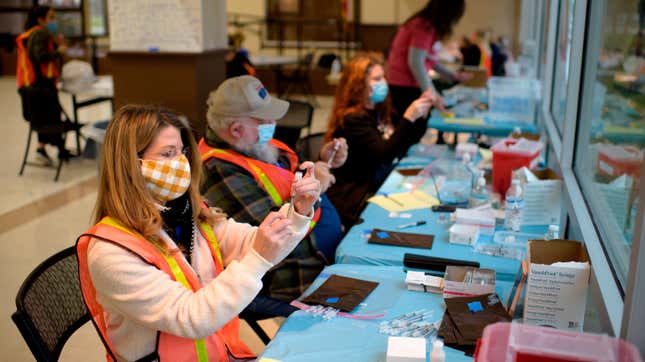
Covid-19 vaccines have been available to the general public for about two months now, though far too few people have been vaccinated. But the real-world data from these vaccines are starting to become clear, and the news is encouraging so far. New reports from the UK and Israel this week suggest that these vaccines are indeed safe and highly effective at preventing illness from covid-19.
On Friday, the Medicines & Healthcare products Regulatory Agency (MHRA)—the UK equivalent of the U.S. Food and Drug Administration—released a report summarizing the available safety data from the Pfizer/BioNTech and Oxford/AstraZeneca vaccines, the two authorized for emergency use in the country. The report covers up to January 24, when it’s estimated that about 7 million UK residents had received at least one dose of either vaccine and a half million had received two doses.
Like many health agencies, the UK keeps track of potential health problems from a new drug or vaccine through a voluntary reporting system that doctors and patients can use. This system, called the Yellow Card scheme, isn’t perfect. That’s mainly because not all reports will be evidence of a true side effect caused by a treatment, since some symptoms that occur after undergoing a treatment will just be a coincidence (this is one reason why controlled clinical trials are used to approve a new drug). Still, they can provide early evidence of side effects that might have gone unnoticed during clinical trials or simply confirm the findings seen from these trials.
Overall, the MHRA found nothing unusual about the safety data it has collected to date. Most reports were about mild and temporary injection site symptoms, like pain and itching, or about symptoms like headache, chills, fatigue, and nausea—just as the clinical trial data had shown. There were a few reports of severe allergic reactions, largely to the Pfizer/BioNTech vaccine, but they appear to be very rare. The UK and other countries now advise that people with a history of severe allergy to any vaccine ingredient should avoid it for the time being, and it’s now standard practice for patients to wait 15 minutes nearby in case there’s any need for immediate treatment of anaphylaxis.
The MHRA also found no evidence of an increased risk of Bell’s palsy, a temporary facial paralysis, following vaccination (some clinical trial data has suggested this as a possible risk). And while some people have died after vaccination, the MHRA has found no evidence to date that vaccines played any role in these deaths.
“Based on current experience, the expected benefits of both covid-19 vaccines in preventing covid-19 and its serious complications far outweigh any known side effects,” the MHRA concluded.
Data from Israel, a country praised for its robust vaccine rollout, is painting a bright picture as well. The daily rate of new cases in the country is declining, and these decreases are at least partly tied to increasing vaccination rates, according to a new paper released by researchers in Israel this week. Importantly, the rate of new cases and hospitalizations dropped more in people over the age of 60 than those younger. Because older Israelis were the first to be vaccinated, that further implicates the role of vaccination in driving cases down. Overall, it’s estimated that around 37% of Israelis have received at least one dose of the vaccine, while 21% have received the full two doses—the highest rates seen worldwide.
Of course, we’re far from the end of the road. In the U.S., as of Friday afternoon, less than 9% of Americans have received their first dose. And though daily new cases and total hospitalizations are steadily declining, they’re still incredibly high, and there were around 3,700 deaths reported yesterday. The rise of more transmissible coronavirus variants also threatens to complicate things, though the U.S. and vaccine-makers are starting to make contingency plans should any wide-spreading variants turn out to greatly reduce the vaccines’ effectiveness. It’s expected that several more effective vaccines will reach the public in the weeks and months to come, including a single-shot candidate from Johnson & Johnson.
Big-picture wise, there’s reason to feel optimistic that the worst of the pandemic will be behind us sooner than later, thanks largely to these vaccines.